Related Research Articles

Ralph Waldo Emerson, who went by his middle name Waldo, was an American essayist, lecturer, philosopher, abolitionist, and poet who led the Transcendentalist movement of the mid-19th century. He was seen as a champion of individualism and critical thinking, as well as a prescient critic of the countervailing pressures of society and conformity. Friedrich Nietzsche thought he was "the most gifted of the Americans," and Walt Whitman called him his "master".

Walter Whitman Jr. was an American poet, essayist, and journalist. He is considered one of the most influential poets in American literature. Whitman incorporated both transcendentalism and realism in his writings and is often called the father of free verse. His work was controversial in his time, particularly his 1855 poetry collection Leaves of Grass, which was described by some as obscene for its overt sensuality.

Leaves of Grass is a poetry collection by American poet Walt Whitman. Though it was first published in 1855, Whitman spent most of his professional life writing, rewriting, and expanding Leaves of Grass until his death in 1892. Six or nine individual editions of Leaves of Grass were produced, depending on how they are distinguished. This resulted in vastly different editions over four decades. The first edition was a small book of twelve poems, and the last was a compilation of over 400.

"Song of Myself" is a poem by Walt Whitman (1819–1892) that is included in his work Leaves of Grass. It has been credited as "representing the core of Whitman's poetic vision."

American poetry refers to the poetry of the United States. It arose first as efforts by American colonists to add their voices to English poetry in the 17th century, well before the constitutional unification of the Thirteen Colonies. Most of the early colonists' work was similar to contemporary English models of poetic form, diction, and theme. However, in the 19th century, an American idiom began to emerge. By the later part of that century, poets like Walt Whitman were winning an enthusiastic audience abroad and had joined the English-language avant-garde.

John Burroughs was an American naturalist and nature essayist, active in the conservation movement in the United States. The first of his essay collections was Wake-Robin in 1871.
20th-century French literature is literature written in French from 1900 to 1999. For literature made after 1999, see the article Contemporary French literature. Many of the developments in French literature in this period parallel changes in the visual arts. For more on this, see French art of the 20th century.
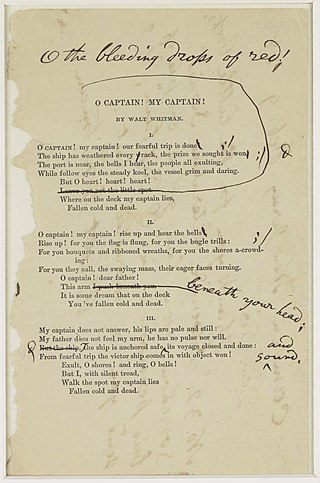
"O Captain! My Captain!" is an extended metaphor poem written by Walt Whitman in 1865 about the death of U.S. president Abraham Lincoln. Well received upon publication, the poem was Whitman's first to be anthologized and the most popular during his lifetime. Together with "When Lilacs Last in the Dooryard Bloom'd", "Hush'd Be the Camps To-Day", and "This Dust Was Once the Man", it is one of four poems written by Whitman about the death of Lincoln.

"When Lilacs Last in the Dooryard Bloom'd" is a long poem written by American poet Walt Whitman (1819–1892) as an elegy to President Abraham Lincoln. It was written in the summer of 1865 during a period of profound national mourning in the aftermath of the president's assassination on 14 April of that year.

William Winter was an American dramatic critic and author, born in Gloucester, Massachusetts. He graduated from Harvard Law School in 1857, then chose literature as his field of endeavor, and moved to New York City (1859), where he became literary critic of the Saturday Press, then (1861–65) of the New York Albion, and for more than 40 years (1865–1909) was a drama critic of the New York Tribune.

"Pioneers! O Pioneers!" is a poem by the American poet Walt Whitman. It was first published in Drum-Taps in 1865. The poem was written as a tribute to Whitman's fervor for the great Westward expansion in the United States that led to things like the California Gold Rush and exploration of the far west.
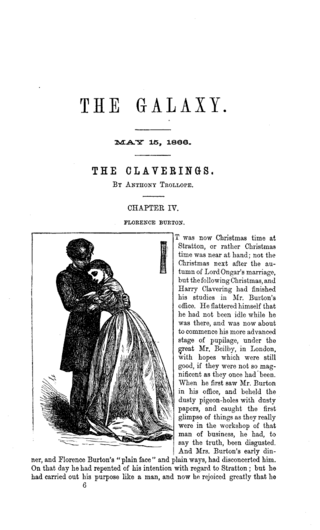
Galaxy Magazine, or The Galaxy, was an American monthly magazine founded by William Conant Church and his brother Francis P. Church in 1866. In 1868, Sheldon and Company gained financial control of the magazine and it was eventually absorbed by The Atlantic Monthly in 1878. Notable contributors to the magazine include Mark Twain, Walt Whitman, Ion Hanford Perdicaris and Henry James.
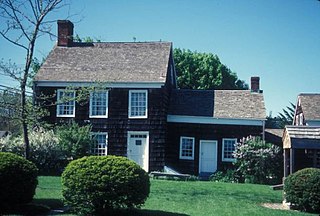
The Walt Whitman Birthplace State Historic Site is a state historic site in West Hills, New York, listed on the National Register of Historic Places. The site preserves the birthplace of American poet Walt Whitman.

"Hush'd Be the Camps To-Day" is a poem by Walt Whitman dedicated to Abraham Lincoln. The poem was written on April 19, 1865, shortly after Lincoln's assassination. Whitman greatly admired Lincoln and went on to write additional poetry about him: "O Captain! My Captain!", "When Lilacs Last in the Dooryard Bloom'd", and "This Dust Was Once the Man." "Hush'd" is not particularly well known, and is generally considered to have been hastily written. Some critics highlight the poem as Whitman's first attempt to respond to Lincoln's death and emphasize that it would have drawn comparatively little attention if Whitman had not written his other poems on Lincoln.

"A Supermarket in California" is a poem by American poet Allen Ginsberg first published in Howl and Other Poems in 1956. In the poem, the narrator visits a supermarket in California and imagines finding Federico García Lorca and Walt Whitman shopping. Whitman, who is also discussed in "Howl", is a character common in Ginsberg's poems, and is often referred to as Ginsberg's poetic model. "A Supermarket in California", written in Berkeley about a market at University Avenue and Grove Street in that city and published in 1956, was intended to be a tribute to Whitman in the centennial year of the first edition of Leaves of Grass.

Drum-Taps, first published in 1865, is a collection of poetry written by American poet Walt Whitman during the American Civil War.

"This Dust Was Once the Man" is a brief elegy written by Walt Whitman in 1871. It was dedicated to Abraham Lincoln, the 16th president of the United States, whom Whitman greatly admired. The poem was written six years after Lincoln's assassination. Whitman had written three previous poems about Lincoln, all in 1865: "O Captain! My Captain!", "When Lilacs Last in the Dooryard Bloom'd", and "Hush'd Be the Camps To-Day".

The American poet Walt Whitman greatly admired Abraham Lincoln, the 16th president of the United States, and was deeply affected by his assassination, writing several poems as elegies and giving a series of lectures on Lincoln. The two never met. Shortly after Lincoln was killed in April 1865, Whitman hastily wrote the first of his Lincoln poems, "Hush'd Be the Camps To-Day". In the following months, he wrote two more: "O Captain! My Captain!" and "When Lilacs Last in the Dooryard Bloom'd". Both appeared in his collection Sequel to Drum-Taps later that year. The poems—particularly "My Captain!"—were well received and popular upon publication and, in the following years, Whitman styled himself as an interpreter of Lincoln. In 1871, his fourth poem on Lincoln, "This Dust Was Once the Man", was published, and the four were grouped together as the "President Lincoln's Burial Hymn" cluster in Passage to India. In 1881, the poems were republished in the "Memories of President Lincoln" cluster of Leaves of Grass.
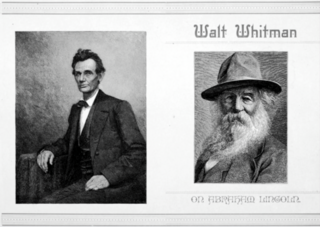
The American poet Walt Whitman gave a lecture on Abraham Lincoln, the 16th president of the United States, several times between 1879 and 1890. The lecture centered on the assassination of Lincoln, but also covered years leading up to and during the American Civil War and often included readings of poems such as "O Captain! My Captain!". The deliveries were generally well received, and cemented Whitman's public image as an authority on Lincoln.
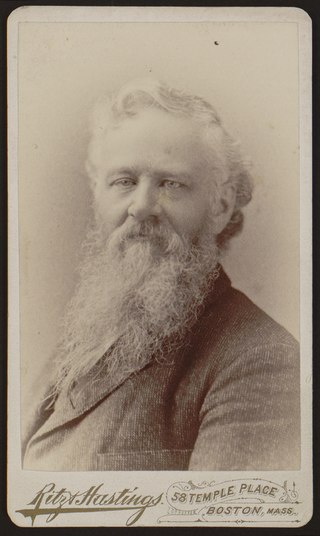
William Douglas O'Connor was an American author, known in part for his association with Walt Whitman. In 1866 he authored The Good Gray Poet, a pamphlet defending Whitman.
References
- ↑ Peck, Garrett (2015). Walt Whitman in Washington, D.C.: The Civil War and America's Great Poet. Charleston, SC: The History Press. p. 150. ISBN 978-1626199736.
- Whitman, Walt (1871). "Democratic Vistas". University of Virginia. Archived from the original on May 7, 2001. Retrieved 9 June 2011.
